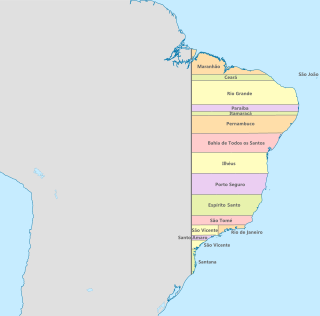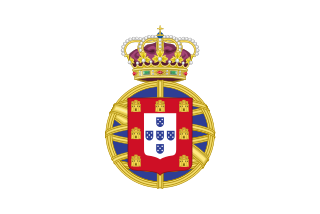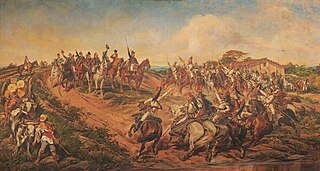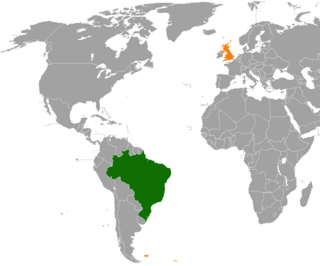
The 1820s was a decade of the Gregorian calendar that began on January 1, 1820, and ended on December 31, 1829.

The Empire of Brazil was a 19th-century state that broadly comprised the territories which form modern Brazil and Uruguay. Its government was a representative parliamentary constitutional monarchy under the rule of Emperors Pedro I and his son Pedro II. A colony of the Kingdom of Portugal, Brazil became the seat of the Portuguese Empire in 1808, when the Portuguese Prince regent, later King Dom John VI, fled from Napoleon's invasion of Portugal and established himself and his government in the Brazilian city of Rio de Janeiro. John VI later returned to Portugal, leaving his eldest son and heir-apparent, Pedro, to rule the Kingdom of Brazil as regent. On 7 September 1822, Pedro declared the independence of Brazil and, after waging a successful war against his father's kingdom, was acclaimed on 12 October as Pedro I, the first Emperor of Brazil. The new country was huge, sparsely populated and ethnically diverse.

Colonial Brazil comprises the period from 1500, with the arrival of the Portuguese, until 1815, when Brazil was elevated to a kingdom in union with Portugal. During the 300 years of Brazilian colonial history, the main economic activities of the territory were based first on brazilwood extraction, which gave the territory its name; sugar production ; and finally on gold and diamond mining. Slaves, especially those brought from Africa, provided most of the workforce of the Brazilian export economy after a brief initial period of Indigenous slavery to cut brazilwood.

Manuel Deodoro da Fonseca was a Brazilian politician and military officer who served as the first president of Brazil. He was born in Alagoas in a military family, followed a military career, and became a national figure. Fonseca took office as provisional president after heading a military coup that deposed Emperor Pedro II and established the First Brazilian Republic in 1889, disestablishing the Empire. After his election in 1891, he stepped down the same year under great political pressure when he dissolved the National Congress. He died less than a year later.

The Barbados Slave Code of 1661, officially titled as An Act for the better ordering and governing of Negroes, was a law passed by the Parliament of Barbados to provide a legal basis for slavery in the English colony of Barbados. It is the first comprehensive Slave Act, and the code's preamble, which stated that the law's purpose was to "protect them [slaves] as we do men's other goods and Chattels", established that black slaves would be treated as chattel property in the island's court.

The Blockade of Africa began in 1808 after the United Kingdom outlawed the Atlantic slave trade, making it illegal for British ships to transport slaves. The Royal Navy immediately established a presence off Africa to enforce the ban, called the West Africa Squadron. Although the ban initially applied only to British ships, Britain negotiated treaties with other countries to give the Royal Navy the right to intercept and search their ships for slaves.

The Eusébio de Queirós Law, officially Law No. 581 of 4 September 1850, was a law passed in the Empire of Brazil on 4 September 1850 to abolish international slave trade in the country. This law was named after Eusébio de Queirós Coutinho Matoso da Câmara, who was the Brazilian Minister of Justice from 1848–1852.
The Irish and German revolt in Brazil was a revolt of German and Irish mercenaries in 1828 during the Cisplatine War of 1825–1828. The immigrants, who were recruited in their homelands to come to Brazil, discovered that the promises made to them by the Brazilian government were not fulfilled. In the revolt, the Irish and Germans took control of large parts of Rio de Janeiro. Citizens of the town and troops from French and British warships suppressed the revolt.

The Aberdeen Act of 1845 was an Act of the Parliament of the United Kingdom passed during the reign of Queen Victoria on 9 August. The long title of the Act is "An Act to amend an Act, intituled An Act to carry into execution a Convention between His Majesty and the Emperor of Brazil, for the Regulation and final Abolition of the African Slave Trade".

The Cisplatine War, also known as the Argentine-Brazilian War or, in Argentine and Uruguayan historiography, as the Brazil War, the War against the Empire of Brazil, or the Liberating Crusade in Uruguay, was an armed conflict in the 1820s between the United Provinces of the Río de la Plata and the Empire of Brazil over Brazil's Cisplatina province, in the aftermath of the United Provinces' and Brazil's independence from Spain and Portugal respectively. It resulted in the independence of Cisplatina as the Oriental Republic of Uruguay.

The United Kingdom of Portugal, Brazil and the Algarves was a pluricontinental monarchy formed by the elevation of the Portuguese colony named State of Brazil to the status of a kingdom and by the simultaneous union of that Kingdom of Brazil with the Kingdom of Portugal and the Kingdom of the Algarves, constituting a single state consisting of three kingdoms.
The liberated Africans of Sierra Leone, also known as recaptives, were Africans who had been illegally enslaved onboard slave ships and rescued by anti-slavery patrols from the West Africa Squadron of the Royal Navy. After the British Parliament passed the Slave Trade Act 1807, which abolished Britain's involvement in the slave trade, the Admiralty established the West Africa Squadron to suppress the trade in cooperation with other Western powers. All illegally enslaved Africans liberated by the Royal Navy were taken to Freetown, where Admiralty courts legally confirmed their free status. Afterwards, they were consigned to a variety of unfree labor apprenticeships at the hands of the Nova Scotian Settlers and Jamaican Maroons in Sierra Leone. During the 19th century, it has been estimated by historians that roughly 80,000 illegally enslaved Africans were liberated by the Royal Navy.

The independence of Brazil comprised a series of political and military events that led to the independence of the Kingdom of Brazil from the United Kingdom of Portugal, Brazil and the Algarves as the Brazilian Empire. It is celebrated on 7 September, the date when prince regent Pedro of Braganza declared the country's independence from the United Kingdom of Portugal, Brazil and the Algarves on the banks of the Ipiranga brook in 1822 on what became known as the Cry of Ipiranga. Formal recognition by Portugal came with the Treaty of Rio de Janeiro, signed in 1825.

The Portuguese royal court transferred from Lisbon to the Portuguese colony of Brazil in a strategic retreat of queen Maria I of Portugal, prince regent John, the Braganza royal family, its court, and senior officials, totaling nearly 10,000 people, on 27 November 1807. The embarkment took place on the 27th, but due to weather conditions, the ships were only able to depart on 29 November. The Braganza royal family departed for Brazil just days before Napoleonic forces invaded Portugal on 1 December 1807. The Portuguese crown remained in Brazil from 1808 until the Liberal Revolution of 1820 led to the return of John VI of Portugal on 26 April 1821.

The Brazilian War of Independence, was waged between the newly independent Brazilian Empire and the United Kingdom of Portugal, Brazil and the Algarves, which had just undergone the Liberal Revolution of 1820. It lasted from February 1822, when the first skirmishes took place, to March 1824, with the surrender of the Portuguese garrison in Montevideo. The war was fought on land and sea and involved both regular forces and civilian militia. Land and naval battles took place in the territories of Bahia, Cisplatina and Rio de Janeiro provinces, the vice-kingdom of Grão-Pará, and in Maranhão and Pernambuco, which today are part of Ceará, Piauí and Rio Grande do Norte states.

The Treaty of Rio de Janeiro is the treaty between the Kingdom of Portugal and the Empire of Brazil, signed August 29, 1825, which recognized Brazil as an independent nation, formally ending the Brazilian war of independence.

Brazil–United Kingdom relations are the diplomatic relations between Brazil and the United Kingdom. Both nations are members of the G20, United Nations and the World Trade Organization.

The Atlantic slave trade to Brazil occurred during the period of history in which there was a forced migration of Africans to Brazil for the purpose of slavery. It lasted from the mid-sixteenth century until the mid-nineteenth century. During the trade, more than three million Africans were transported across the Atlantic and sold into slavery. It was divided into four phases: The Cycle of Guinea ; the Cycle of Angola which trafficked people from Bakongo, Mbundu, Benguela and Ovambo; Cycle of Costa da Mina, now renamed Cycle of Benin and Dahomey, which trafficked people from Yoruba, Ewe, Minas, Hausa, Nupe and Borno; and the Illegal trafficking period, which was suppressed by the United Kingdom (1815-1851). During this period, to escape the supervision of British ships enforcing an anti-slavery blockade, Brazilian slave traders began to seek alternative routes to the routes of the West African coast, turning to Mozambique.

The Black Guard of the Redemptress was a paramilitary secret society in Rio de Janeiro composed of Brazilian former African slaves freed on May 13, 1888, by the signature of the Golden Law by Isabel, Princess Imperial of Brazil.

Francisco Jê Acaiaba de Montezuma, first and only Viscount of Jequitinhonha, born Francisco Gomes Brandão, was a Brazilian jurist, diplomat and politician. He was a senator for the province of Bahia from 1851 to 1870, commanded two ministries during the regency of Diogo Antônio Feijó and was president of the Bank of Brazil.


















